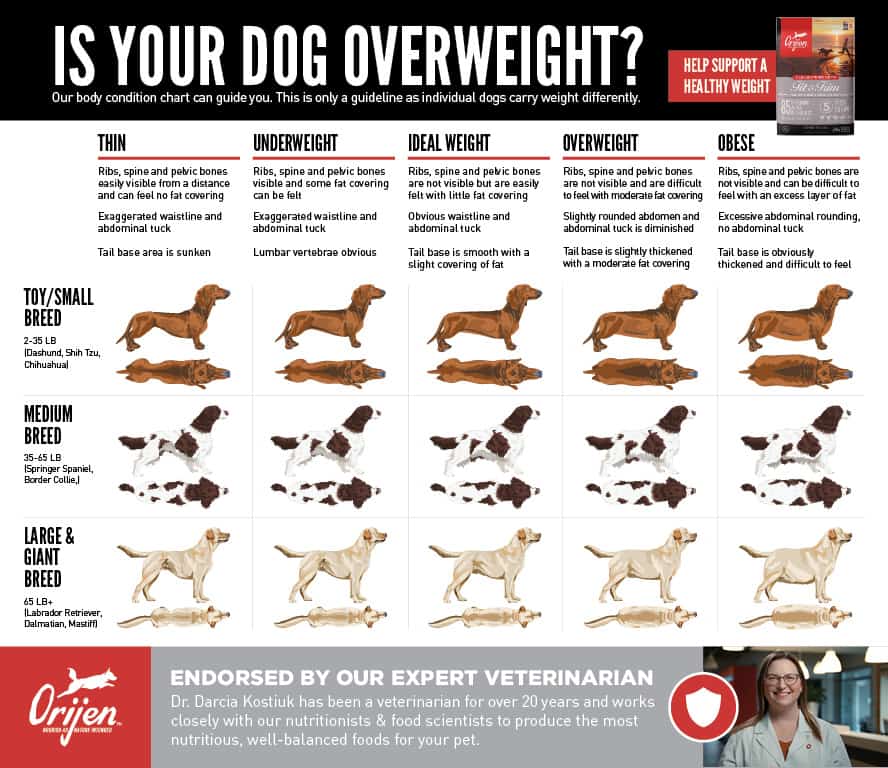Chubby pups might be endearing to look at, but when thinking about the health of our dogs, it’s best they maintain a trim figure.
Unfortunately, similar to humans, a significant number of dogs struggle with weight issues. The Association For Pet Obesity Prevention (APOP) reported in a 2015 survey that over half of American dogs are heavier than recommended. This is not just a U.S. issue. Research from around the world indicates that about 40% of dogs globally face obesity, with this statistic trending upward.
Worryingly, an overwhelming 95% of dog owners fail to recognize their pet’s weight issue, often mistaking an obese pet for one at a healthy weight. This “fat pet misconception” is a significant concern, as pointed out by Dr. Ernie Ward, APOP’s founder. He mentions, “The perception that an overweight pet is healthy makes it challenging to address obesity.”
The Health Implications of Canine Obesity:
Excessive weight in dogs can lead to a myriad of health problems, such as:
1. Type 2 Diabetes
Just like in humans, overweight dogs are at a higher risk of developing diabetes due to increased insulin resistance. This condition requires daily insulin injections and regular monitoring, making it essential to maintain a dog’s healthy weight to prevent it.
2. Hip-Related Osteoarthritis:
Excess weight puts additional strain on your dog’s joints, particularly the hips. This can expedite the wear and tear of the joint cartilage, leading to inflammation, pain, and decreased mobility. Over time, your dog might struggle with simple tasks like standing up or climbing stairs.
3. Elevated Blood Pressure (Hypertension)
High blood pressure can stress your dog’s heart, kidneys, and other organs. This can result in a range of health issues, from heart disease to blindness.
4. Skin Disorders:
Excess fat folds can be breeding grounds for bacteria and yeast, leading to infections and dermatitis. Overweight dogs might also develop pressure sores or have difficulty grooming themselves, exacerbating skin issues.
5. Heart and Respiratory Diseases:
Extra weight demands more oxygen and blood, putting a strain on your dog’s heart and lungs. This can result in conditions like heart murmurs or an enlarged heart, leading to congestive heart failure in severe cases.
6. Decreased Stamina and Heat Intolerance:
Overweight dogs often exhibit reduced endurance when exercising and might struggle in warm conditions. Their excess body fat acts as insulation, making them overheat faster than their lean counterparts.
7. Decreased Life Expectancy:
Beyond specific diseases, multiple studies have shown that obese dogs live shorter lives compared to those at a healthy weight. By ensuring your dog maintains a healthy weight, you’re offering them the best chance at a long, fulfilling life.
Identifying If Your Dog Is Overweight
It’s crucial to visually assess and touch your pet to gauge its weight. For instance, when lightly pressing on your dog’s side, you should easily feel its ribs. Several pet-food producers provide body-condition charts to aid in this assessment.

Steps to Ensure a Healthy Weight for Your Dog:
By taking these steps and maintaining awareness, you can ensure a longer, healthier, and happier life for your dog.
1. Consult a Veterinarian:
Before making any dietary changes, ensure that the extra weight isn’t due to any underlying health issues. Your vet will provide guidance on dietary adjustments.
2. Monitor Meal Portions
It’s essential to measure your dog’s food accurately, and a diary can be a useful tool to track this.
3. Have a Feeding Schedule:
Instead of free-feeding, give your dog meals at specific times and remove any leftover food after your dog walks away.
4. Regulate Snacks:
Treats and extras, even from well-meaning neighbors, can significantly contribute to your dog’s calorie intake. Monitor and control these.
Some treats, including many commercially available ones, are surprisingly calorie-dense. Consider healthier alternatives like fruits and vegetables (bananas, carrots, apples, cucumbers)
5. Stay Active:
Physical activity is paramount. Before initiating any workout routine, consult with your vet. Some excellent starter activities include:
- Swimming: A fantastic low-impact exercise that builds muscle without stressing the joints.
- Walking: Simple yet effective, and it provides fresh air and bonding time.
- Fetch: A fun game that combines short bursts of running, great for improving fitness.
Let’s face it – there’s something irresistibly adorable about a roly-poly pup waddling around.
But while those extra rolls might seem cute, they’re masking underlying health risks that can curb your dog’s zest for life.
Being the owner your dog deserves™ isn’t just about the treats and cuddles; it’s about ensuring our furballs stay fit and fabulous!
Remember, a leaner pup isn’t just about looks – it’s about quality and longevity of life. So, if you want to truly “Be the owner your dog deserves™,” let’s trade those pudgy pounds for playful prances and long, healthy tail wags.
Here’s to many more years of fetch, frolic, and fun! 🐾🎾🌟
Opening Hours
M-Sa: 10am - 7pm
Address
1111 Central Ave., Charlotte, NC 28204
Phone
844 864 3647

